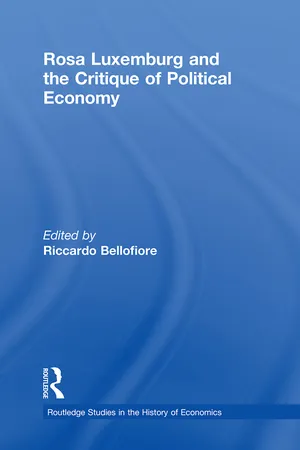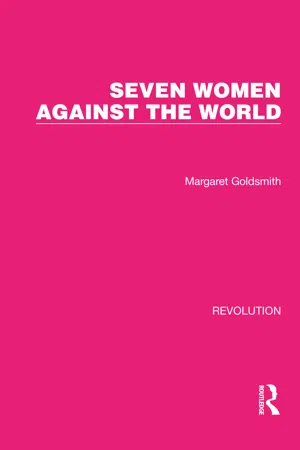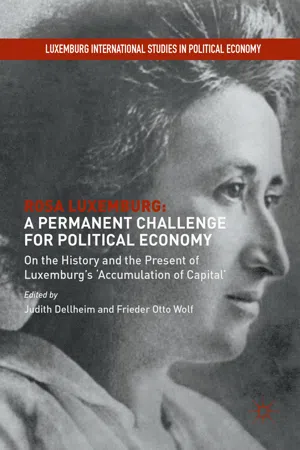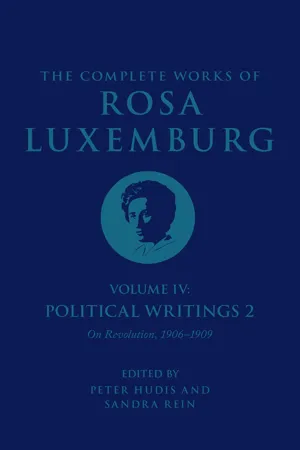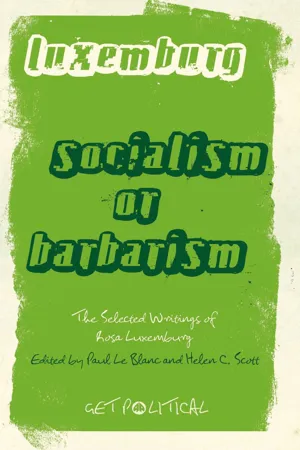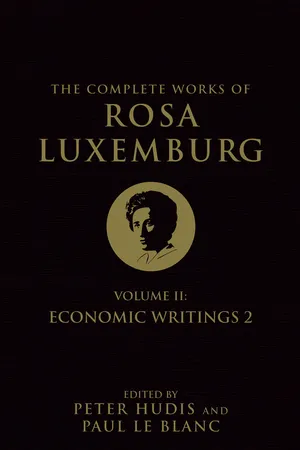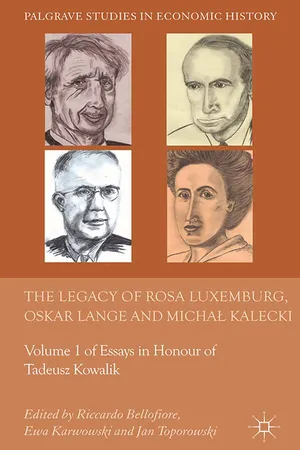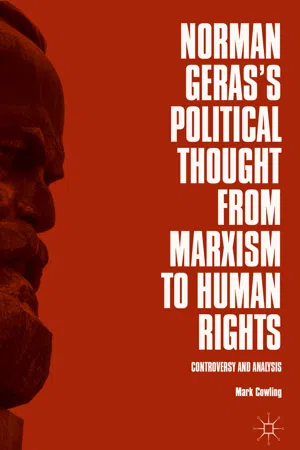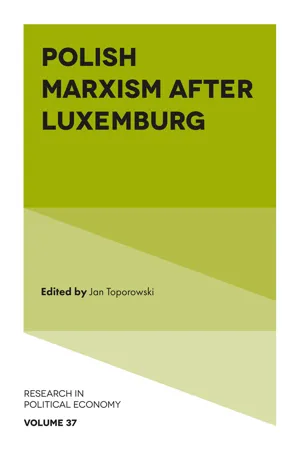Politics & International Relations
Rosa Luxemburg
Rosa Luxemburg was a prominent Marxist theorist and revolutionary socialist who played a key role in the German and Polish labor movements. She was a fierce critic of capitalism and imperialism, advocating for international solidarity and workers' rights. Luxemburg's ideas on democracy, class struggle, and the revolutionary potential of the working class continue to influence leftist political thought.
Written by Perlego with AI-assistance
Related key terms
Related key terms
1 of 4
Related key terms
1 of 3
10 Key excerpts on "Rosa Luxemburg"
- Riccardo Bellofiore(Author)
- 2009(Publication Date)
- Routledge(Publisher)
re-evaluation of an original tradition in the Polish case. These events and the topics represent on the whole a very rich and fascinating chapter in the history of socialist political culture, to which it would be worthwhile to dedicate oneself, but, on this occasion, I would only like to clarify the role of Rosa Luxemburg in a specific moment of the European socialist movement, that is, in the years around the time of the First Russian Revolution up to the First *English text revised by August Viglione. World War. In these years Rosa Luxemburg’s thought on trade unions and the party is particularly rich and original in respect of the classical approaches to these subjects in the Marxism of the Second International. Her conceptions, however, cannot be considered as a systematic alternative elaboration; they should more likely be considered as replies to the problems caused by the geographic expansion of socialism, by the growth of social and political experience of the working-class movement, by the new events the movement had to cope with. Between East and West I believe that an essential way of interpreting Luxemburg’s theoretical and political contribution in this historical period is the understanding of her particular position in the international socialist movement. This was already indicated by various scholars, but perhaps not fully developed. Rosa Luxemburg plays a very stimulating and visible role—which differentiates her from other ‘travellers’ of the European Left, such as Karl Radek and even the more influential Parvus 2 —as a binding figure between East and West (Schmidt, 1988), in particular with regard to the entry onto the scene of the labour movement in the Russian Empire and the political and organizational developments of this movement in the area dominated by the ‘model party’ of the Second International, the German Social Democratic Party (SDP)- eBook - ePub
- Margaret Goldsmith(Author)
- 2022(Publication Date)
- Routledge(Publisher)
Rosa Luxemburg (1870–1919)Many of the revolutionary women of the nineteenth century were great and romantic figures whose heroic gestures inspired the masses, but none of them made a lasting contribution to revolutionary thought. In fact, it must be admitted that few of them thought clearly at all. Many of them were outstanding examples, but none of them were leaders, none of them were of international importance.Rosa Luxemburg, the leader of the German Spartakusbund during the Great War, and the founder of the German Communist Party, was one of the first women whose mind, and whose actions, have left a permanent impression on the international revolutionary movement. She is generally acknowledged— by friends as well as enemies—to be one of the outstanding figures of our century, because—quite apart from the humanity she shared with earlier women revolutionaries—she combined a stupendous knowledge of economics with a keen imagination and a rare gift for action. She made original contributions to Socialist theory, but at the same time she fought in the front line of her movement. She founded the first German Communist newspaper, Die Rote Fahne> and was a brilliant journalist, but she never remained a passive observer. She was murdered by her opponents while on active service for her cause.She was unusual also, because her knowledge and her contributions were not confined to the revolutionary movement of Germany, the country where she was killed. She was a Jewess, born in Poland, who knew Poland and Russia intimately; she was educated in Switzerland and in Paris, and she spent many years in Germany. She studied every problem before her from an international point of view ; she was perfectly qualified to be a judge and a leader of the International Socialist movement.Rosa Luxemburg was born on the 5th of March, 1870, in the town of Zamosc, in Russian Poland, but when she was three years old her parents moved to Warsaw, where she spent her childhood. Her father was a merchant who was greatly respected in Warsaw, and both he and her mother came of intellectual Jewish families. Russian and Polish were spoken in the home, but Eduard Luxemburg preferred the Polish language. He was one of those Polish Liberals who still hoped for Poland’s independence, despite the fact that in the ’seventies and the ‘eighties the Polish struggle for liberation from Russia was at its lowest ebb. - eBook - ePub
Rosa Luxemburg: A Permanent Challenge for Political Economy
On the History and the Present of Luxemburg's 'Accumulation of Capital'
- Judith Dellheim, Frieder Otto Wolf, Judith Dellheim, Frieder Otto Wolf, Judith Dellheim, Frieder Otto Wolf(Authors)
- 2016(Publication Date)
- Palgrave Macmillan(Publisher)
© The Author(s) 2016Begin AbstractRosa Luxemburg: A Permanent Challenge for Political Economy Luxemburg International Studies in Political Economy 10.1057/978-1-137-60108-7_2Judith Dellheim andFrieder Otto Wolf (eds.)2. Rosa Luxemburg and Contemporary Capitalism
End AbstractGreg Albo 1(1) Department of Political Science, York University, Toronto, ON, CanadaIntroduction
Rosa Luxemburg (1871–1919) occupies an unusual place in the traditions of the western, and indeed, global Left, being met variously by scorn, silence and veneration. This is a response, in the first instance, to her powerful political interventions and ceaseless invocation of revolution to break the hammerlock of capitalism on democracy and development. But it is also a reflection of the reaction that greeted her major economic text, The Accumulation of Capital (1913), when it was first published just over a hundred years ago, and the abjuration that still greets that text among social scientists and militants today.For modern social democracy, it has been all but impossible to avoid judging Luxemburg with scorn: hopelessly insurrectionist and naively idealist in the face of a necessary political realism. Her masterpiece polemic, Reform and Revolution (1900), remains, even for readers today, a blistering assault on revisionism, and for modern social democracy an unforgivable breach. For them, its political determinism misread political evolutions in the same way that The Accumulation of Capital misunderstood the changing dynamics of accumulation.Although the official communist parties, from the Bolsheviks after Lenin onwards, turned her into a heroine, Luxemburg’s actual political and economic writings were met with silence. The searing critique of democracy within the post-revolutionary context was too filled with minefields for open discussion; and they had to be sealed off as these parties Stalinised and theoretically ossified (Josef Stalin himself linked Luxemburg with Leon Trotsky’s theories of uneven development, which was for him the ultimate heresy). The Accumulation of Capital , moreover, rivalled V.I. Lenin’s Imperialism - eBook - ePub
The Complete Works of Rosa Luxemburg Volume IV
Political Writings 2, On Revolution 1906-1909
- Rosa Luxemburg, Peter Hudis, Sandra Rein, Jacob Blumenfeld, Nicholas Gray, Henry Holland, Zachary King, Manuela Kölke, Joseph Muller(Authors)
- 2022(Publication Date)
- Verso(Publisher)
Introduction: Rosa Luxemburg’sConcept of RevolutionRosa Luxemburg continues to capture the imagination of activists and scholars worldwide; in fact, today interest in her life and works is enjoying a veritable renaissance. This is no small feat for an individual whose intellectual and activist life reached its height in the early twentieth century. It is no small feat for a woman of her generation. And it is no small feat for a disabled Polish Jewish émigré (or exile, depending on your perspective) in Germany. But, on balance, Rosa Luxemburg was not a socialist who thought small or acted small. Although she faced many forms of exclusion in her time, it was impossible for socialists to ignore her clear-minded analysis and single-minded commitment to social change.So why does it become especially difficult to ignore her today, even though she lived in a period so different from ours and the issues she discussed are so rooted in the particularity of her era? It is because of the rise of a whole series of spontaneous grassroots movements for freedom around the world since the global economic recession of 2008, which reached its sharpest and most creative expression in 2020 with the response to the glaring inequities exposed by the COVID-19 pandemic and mass protests against police abuse and for racial justice. These protests and movements—which that spring and summer occurred in over 2,400 US towns and cities and in dozens of countries around the world—were the product of a new generation of activists seeking a liberatory - eBook - ePub
Rosa Luxemburg: Socialism or Barbarism
Selected Writings
- Rosa Luxemburg, Helen C. Scott, Paul Le Blanc, Helen C. Scott(Authors)
- 2010(Publication Date)
- Pluto Press(Publisher)
Luxemburg offers us rich insights even in what some on the Left consider to be problematical texts – for example, when she expresses views divergent from Lenin’s on imperialism, the national question, in the Russian Revolution on the question of land to the peasants and the dissolution of the Constituent Assembly, and in 1904 on questions of party organisation. On certain issues she may, in fact, see more deeply and clearly than Lenin – but even when she doesn’t, she nonetheless adds to our thinking.Especially important for us today, also, is the unresolved issue with which she wrestled over decades: the interplay of Marxist activists with the larger labour movement, negotiating between what she called ‘the two dangers’ of ‘sinking back to the condition of a sect’ or ‘becoming a movement of bourgeois social reform’. We owe it to Luxemburg and to ourselves to give all that she wrote and said and did around this issue both a sympathetic and a critical reading, seeking to develop new and useful insights for advancing the labour and socialist movements, a goal for which she herself was always reaching.Notes
1 . Victor Grossman, ‘Unity – In Memory of Rosa Luxemburg’ (http://mrzine.monthlyreview.org/grossman170106.html ); Pallo Jordan, ‘15 Years Since the Murder of Chris Hani’, Links (http:links.org.au/node/342 ); Paul Le Blanc, ‘Rosa Luxemburg in South Africa’ (http://marxsite.com/Rosa%20Luxemburg%20in%20South%20Africa.htm ); Paul Le Blanc, ‘Conference and Discussion on Rosa Luxemburg at Wuhan University, People’s Republic of China’, Labor Standard (http://www.laborstandard.org/New_Postings/Rosa_in_China.htm ); Sobhanlal Datta Gupta, ed. Readings in Revolution and Organisation: Rosa Luxemburg and Her Critics – Lenin, Luxemburg, Trotsky, Stalin, Lukacs (Calcutta: Pearl Publishers, 1994).2 . Paul Frölich, Rosa Luxemburg: Ideas in Action , 1939, trans. Joanna Hoornweg (London: Pluto, 1972), 28.3 . Rosa Luxemburg Foundation Exhibition, http://www.rosalux.de/cms/index . php?aktuell4 . PierreBroué, The German Revolution 1917–1923 , 1971, trans. John Archer (Chicago: Haymarket Books, 2006), 17.5 . Mary Nolan, Social Democracy and Society: Working-Class Radicalism in Dusseldorf, 1890–1920 (New York: Cambridge University Press, 1981), 3.6 . See Carl E. Schorske, German Social Democracy, 1905–1917 - eBook - ePub
The Complete Works of Rosa Luxemburg, Volume II
Economic Writings 2
- Rosa Luxemburg, Peter Hudis, Paul Le Blanc, Nicholas Gray, George Shriver(Authors)
- 2015(Publication Date)
- Verso(Publisher)
I. Lenin, Revolution, Democracy, Socialism: Selected Writings, edited by Paul Le Blanc (London: Pluto Press, 2008), pp. 205–15. § Hannah Arendt, “Rosa Luxemburg, 1870–1919,” in Men in Dark Times (New York: Harcourt, Brace and World, 1968), p. 40. Kowalik, in Rosa Luxemburg and the Critique of Political Economy, edited by Bellofiore, p. 106. IV. The theoretical tool that Luxemburg developed in her critique of Marx may be too compelling, however, to be so easily jettisoned. Some critics have argued that capitalism is more complex, more dynamic than Luxemburg allows. * Others, however, are powerfully drawn to her notion that “the accumulation of capital, as an historical process, depends upon non-capitalist social strata and forms of social organization.” David Harvey, for example, has insisted that “the notion that capitalism must perpetually have something ‘outside of itself’ in order to stabilize itself is worthy of scrutiny.” A consequence of relentlessly seeking new outlets for surplus capital and of securing cheaper inputs for the accumulation process, Harvey notes, is that “the ‘organic relation’ between expanded reproduction on the one hand and the often violent dispossession on the other have shaped the historical geography of capitalism.” † Capital, Luxemburg wrote, “cannot do without the means of production and labor-power of the entire planet.” ‡ It can be argued that this is true of all territories indeed, including the territories of our bodies, our family life, our friendships, our creative drives, our sexuality, our dreams, and multiple community and social and cultural activities—permeated by noncapitalist dimensions and energies even in global regions where an advanced capitalist economy more and more predominates. This is reflected in voracious drives for “privatization” as well as in rampant consumerism in so-called “advanced” countries - eBook - ePub
The Legacy of Rosa Luxemburg, Oskar Lange and Micha? Kalecki
Volume 1 of Essays in Honour of Tadeusz Kowalik
- R. Bellofiore, E. Karwowski, J. Toporowski, R. Bellofiore, E. Karwowski, J. Toporowski(Authors)
- 2013(Publication Date)
- Palgrave Macmillan(Publisher)
The Crisis of German Social Democracy [ ... ]. (Lange, 1936–1944: pp. 36–36a)7.5.2 Against bureaucratic socialismLange’s agreement with many of the political issues raised by Rosa Luxemburg inevitably determined that his socialist theory was also influenced by his fellow countrywoman, at least with regards to three crucial aspects.First, he emphasised on many occasions (1936b, 1987 [1942]) the importance of a resolute transition to socialism, in order to prevent a reaction by the capitalists on both political and economic grounds (for instance, by means of damage or sabotage to the expropriated productive plants) similar to those that had taken place in the USSR.His beliefs were fairly effectively summed up in a definition of socialism as ‘a policy of revolutionary courage’ and ‘not an economic policy for the timid’ (Lange, 1936b: pp. 135–136). Far from being a voluntarist deviation from Marxism (as resoluteness follows from a scientific analysis of the economic conjuncture), in the writer’s eyes these statements clearly echo the emphasis on action that we can trace in Rosa Luxemburg’s programme of the Spartakusbund , published on 14 December in Rote Fahne and entitled ‘What Does the Spartacus League Want?’In a crucial passage about the transition to socialism, Rosa Luxemburg remarked upon the risk of a capitalist reaction and she emphasised the consequent necessity of a steadfast determination:The imperialist capitalist class [ ... ] will mobilize heaven and hell against the proletariat. It will mobilize the peasants against the cities, the backward strata of the working class against the socialist vanguard; it will use officers to instigate atrocities; it will try to paralyze every socialist measure with a thousand methods of passive resistance; it will force a score of Vendées on the revolution; it will invite the foreign enemy [ ... ] All this resistance must be broken step by step, with an iron fist and ruthless energy. The violence of the bourgeois counterrevolution must be confronted with the revolutionary violence of the proletariat. (Luxemburg, 1971[1918]: section III) - eBook - ePub
Norman Geras's Political Thought from Marxism to Human Rights
Controversy and Analysis
- Mark Cowling(Author)
- 2018(Publication Date)
- Palgrave Macmillan(Publisher)
© The Author(s) 2018 Mark Cowling Norman Geras’s Political Thought from Marxism to Human Rights https://doi.org/10.1007/978-3-319-74048-5_2Begin Abstract2. The Legacy of Rosa Luxemburg
End AbstractMark Cowling1(1) Teesside University [retired], Middlesborough, UKGeras’s first major work was The Legacy of Rosa Luxemburg (Geras 1983 , originally published in 1976). Geras describes this as a collection of essays, and this is a very common pattern in his other books, which tend to be collections of essays on closely related themes. The first essay in this book looks at the relationship between Luxemburg’s economic theory of capitalist breakdown and her political ideas, particularly disputing the idea that she had a ‘spontaneist’ conception of class struggle. The second essay deals with her ideas about the nature of the Russian Revolution following the abortive Revolution of 1905, together with her ideas about democracy. The third essay discusses her ideas about the mass strike, which Geras argues she sees as an element in the preconditions of successful proletarian revolution. The final essay discusses Luxemburg’s criticisms of the Bolsheviks in 1918 and the insistence on democratic rights and freedoms both in the course of revolution and after it. For each essay I shall follow the procedure that will be followed throughout the book, namely offering an exposition of Geras’s ideas, followed by a more or less extended commentary.Barbarism and the Collapse of Capitalism
Geras makes it clear that Luxemburg did subscribe to the idea of a collapse of capitalism. In contrast to revisionists such as Bernstein she argued that Marxism is distinguishable from reformism because it believes in a breakdown of capitalism, a catastrophe (Geras 1983 , p. 14). The reason for this was that capitalist accumulation must come to a stop when capitalism dominates production in all countries. At that point it will be impossible to realize surplus value (Geras 1983 , p. 15). A simplistic version of Luxemburg would thus argue that the coming of socialism is pretty much automatic—with capitalist collapse there will be mass actions that lead to socialism (Geras 1983 , p. 16). This is, as will be imagined, too simplistic. Geras points out that Luxemburg said that a purely spontaneous development from the collapse of capitalism would merely lead to a crisis of civilization, to a new Dark Age (Geras 1983 , p. 18). However, Luxemburg makes it clear that the collapse of capitalism is a precondition of socialism, but that socialism depends upon ‘conscious interference’ and working-class ‘political struggle’ (Geras 1983 , p. 19). In the famous Junius Pamphlet , (1915) Geras points out that Luxemburg talks of the proletariat being under the leadership of Social Democracy (Geras 1983 , p. 21). Practice divorced from theory is a ‘sad caricature’ of Marxism (Geras 1983 - eBook - ePub
Philosophia
The Thought of Rosa Luxemborg, Simone Weil, and Hannah Arendt
- Andrea Nye(Author)
- 2013(Publication Date)
- Routledge(Publisher)
Like other Marxists, Luxemburg did not describe in detail what democratic institutions and practices might be like in socialism. Her Marxist materialism ruled out in principle ideals that are not generated in actual economic and historical processes; a workers' democracy would have to emerge in the course of revolution. But she grappled with problems inherent in any attempt to install a true “rule of the people.” How can the unity necessary in political or social movements be achieved in a way that does not do violence to the diversity and freedom of individuals? An answer to this question, passionately and sometimes angrily discussed between feminists, is crucial for any revolutionary movement. For feminists, the question has often taken the form of the essentialist/relativist dilemma. Either some sufficiently general definition of “woman” or “femininity” must provide unity, a definition which inevitably is exclusive of some groups and perspectives, or diversity and pluralism are claimed as the basis of a unfocused politics of difference.Luxemburg suggests an alternative. A coherence of aims that might provide a nonoppressive unity to replace doctrinal fidelity or party policy can be generated, as were Luxemburg's own theoretical positions, out of close observation and involvement in actual women's movements. Study of, participation in, and hard thought about the actions of oppressed people in times of crisis and discontent isolates directions, meanings, tendencies, common aspirations, and goals to unify policy. The politics that results is not the autonomous creation of any theorist, the intuition of any idealist essence or the application of any theory, but reflects the “sensuous activity” of social agents themselves. As she guides, facilitates, and directs, stands with a social movement, a Luxemburgian leader speaks for others without dictating, makes clear what their actions mean in the aggregate and how they might be organized, coordinated, and carried forward. Such a politics requires open channels of communication, constant reciprocity between leaders and masses, healthy grass-roots activist groups, and institutions that make each accountable to the other. - eBook - ePub
- Jan Toporowski, Jan Toporowski(Authors)
- 2022(Publication Date)
- Emerald Publishing Limited(Publisher)
At the beginning, her attitude towards Marx is well represented by what I would call Rosa Luxemburg the ‘Marxist’ theoretician. Take the 1903 essay on ‘Stagnation and Progress in Marxism’ (Luxemburg, 1903). The thesis is simple. What Marx left us is fully adequate, without the need for further elaboration. The same Capital remains scarcely used: only volume I is what is understood and used. But Marx's work is definitive: the stagnation of Marxism is thereby due to the fact that reality itself has not matured enough so that the other theoretical gems in Volume II and III could be extracted. In fact, she wrote, ‘it is not true that Marx no longer suffices for our needs. On the contrary, our needs are not yet adequate for the utilisation of Marx's ideas’. Very different is her attitude in The Accumulation of Capital. As she wrote in the Anti-Critique : ‘Marxism is a revolutionary world outlook which must always strive for new discoveries, which more than anything else dislikes formulations valid once and forever, and whose living force is best preserved in the clash of self-criticism and in the lights and thunders of history’ (Luxemburg, 1921). This is what I would call Rosa Luxemburg ‘the Marxian’. The criticisms levelled against The Accumulation of Capital by theoreticians of the Second and Third International, while exploiting some weaknesses in her approach, were unable to understand the novelty of her argument. That is why the best commentators on Rosa Luxemburg ‘the economist’ have been Joan Robinson and Michał Kalecki, and then Tadeusz Kowalik (cf: Bellofiore, 2014), who recognised in her contentions the anticipation of the principle of effective demand. None of these authors, however, grasped the inner connection between Luxemburg's overinvestment theory of the crisis and her unbalanced theory of accumulation and wage, which is grounded on Marx's value theory of labour
Index pages curate the most relevant extracts from our library of academic textbooks. They’ve been created using an in-house natural language model (NLM), each adding context and meaning to key research topics.
Explore more topic indexes
Explore more topic indexes
1 of 6
Explore more topic indexes
1 of 4
